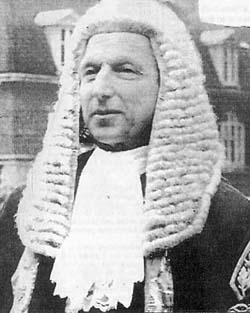Judge's army links leads to calls for quashing of anonymity to Bloody Sunday Paras
By Pádraig MacDabhaid
|

Lord Woolf
|
THE FAILURE of Britain's Master of the Rolls, Lord Woolf, to declare his past links with the British army has led to calls that the decision to grant anonymity to Parachute Regiment soldiers involved in the Bloody Sunday massacre be quashed.
The new information comes to light after what appeared to be the fourth and final rejection by English judges, at the English Divisional Court and the Court of Appeal, of the Bloody Sunday inquiry's ruling that British soldiers should not be granted anonymity when giving evidence.
This was seen as a major victory by elements within the British military establishment and the Tory press because the decision by the English Courts to grant anonymity will not be challenged by the new Bloody Sunday inquiry.
Lord Woolf, who has presided over two Bloody Sunday anonymity hearings at the English Court of Appeal, including the latest and final decision, voted in favour of the British soldiers remaining anonymous.
ARMY LEGAL SERVICES
The discovery about Lord Woolf's British army past was made by Paul O'Connor, a human rights worker at the Pat Finucane Centre in Derry.
O'Connor was curious about the background of the three law lords who had ruled in favour of the Paras. He discovered that Woolf was a captain in the Royal Hussars and that he had even served two years in the British army's legal services.
The call to have the anonymity decision quashed is based on a precedent set during the case of Chilean dictator Augusto Pinochet.
When the possibility arose last January that Woolf could be involved in a new hearing about Pinochet, he is reported to have withdrawn from an Amnesty International fund-raiser.
A three to two ruling by the law lords on 25 November1998 directed that Pinochet was not immune from arrest and prosecution for crimes against humanity.
However, things began to go wrong for the law lords when it emerged that one of those who voted against Pinochet, Lord Hoffmann, had failed to disclose his links with Amnesty International.
Several of Hoffmann's judicial colleagues were scathing in their criticism of him, and the international embarrassment his omission had caused within their circle.
He was accused of acting as ``a judge in his own cause'' by failing to declare his Amnesty links.
other of his colleagues, Lord Hope, said:
``Judges are well aware they should not sit in a case where they have even the slightest personal interest in it, either as defendant or as prosecutor.''
The judgement made by the panel including Hoffmann was set aside on 17 December and a new hearing was ordered for this year.
The British judiciary now has no option but to follow its own example in the Hoffmann case and quash the decisions of the English Court of Appeals over which Woolf presided.
A QUESTION OF BIAS
Speaking about the revelation, John Kelly, whose brother Michael was killed on Bloody Sunday, said:
``The English judiciary has interfered on two occasions with an international Inquiry which is searching for the truth into the events of Bloody Sunday. This information that Lord Woolf was attached to Army Legal Services after qualifying as a barrister is alarming. There is a question mark over his independence in light of this information. There is also a question of bias.
``He has dealt on two occasions with the Court of Appeal hearing on the issue of soldiers' anonymity. He has never declared his previous employment with the Army Legal Services nor his status as captain in the Royal Hussars.
``We are extremely alarmed at this information as Lord Widgery was also a former British army officer serving as a lieutenant colonel in the Royal Artillery and as a brigadier in the Territorial Army.''